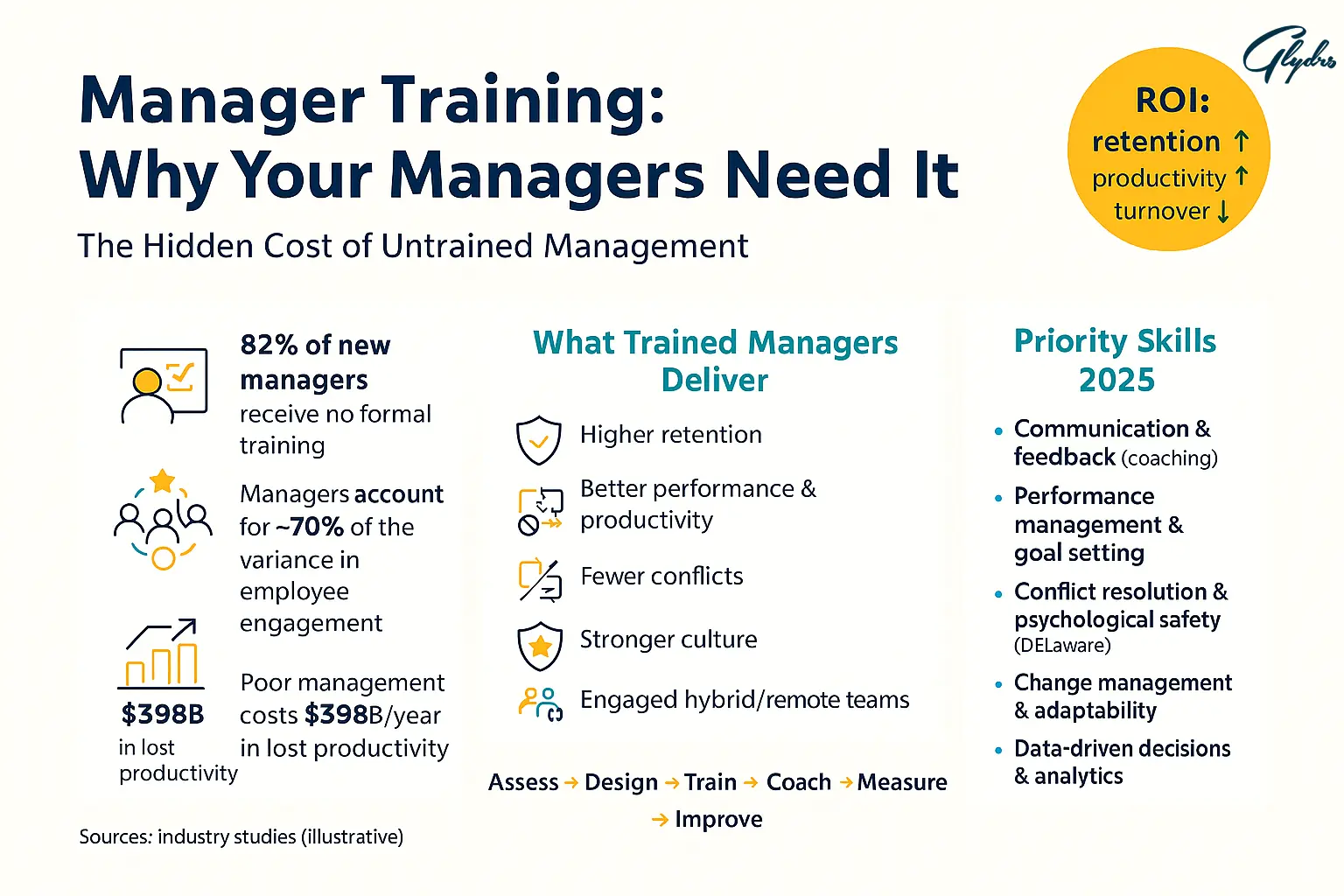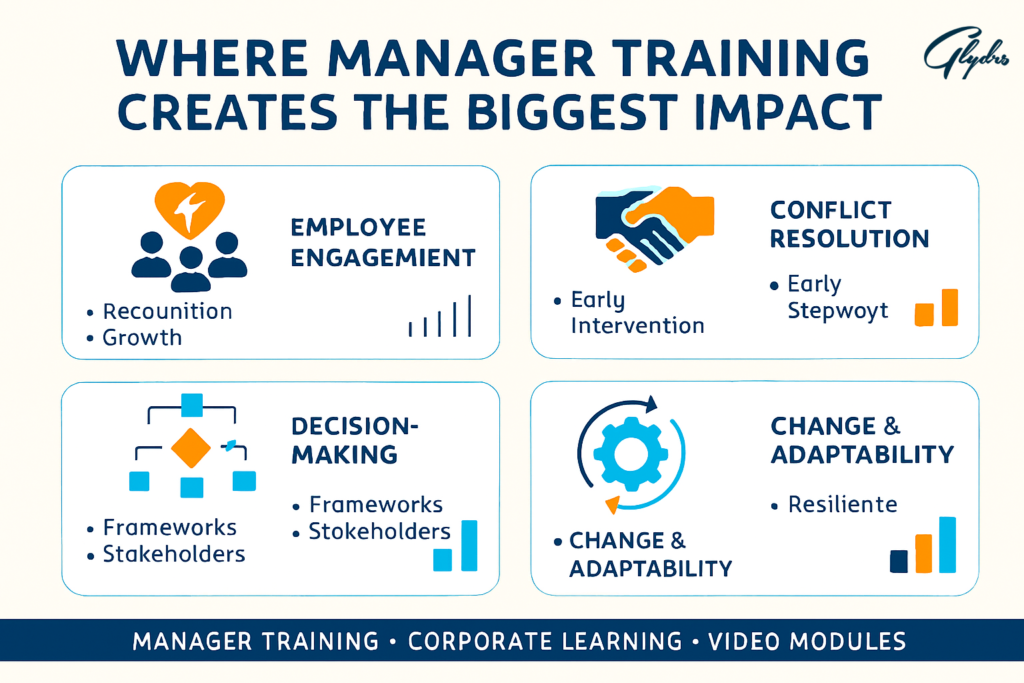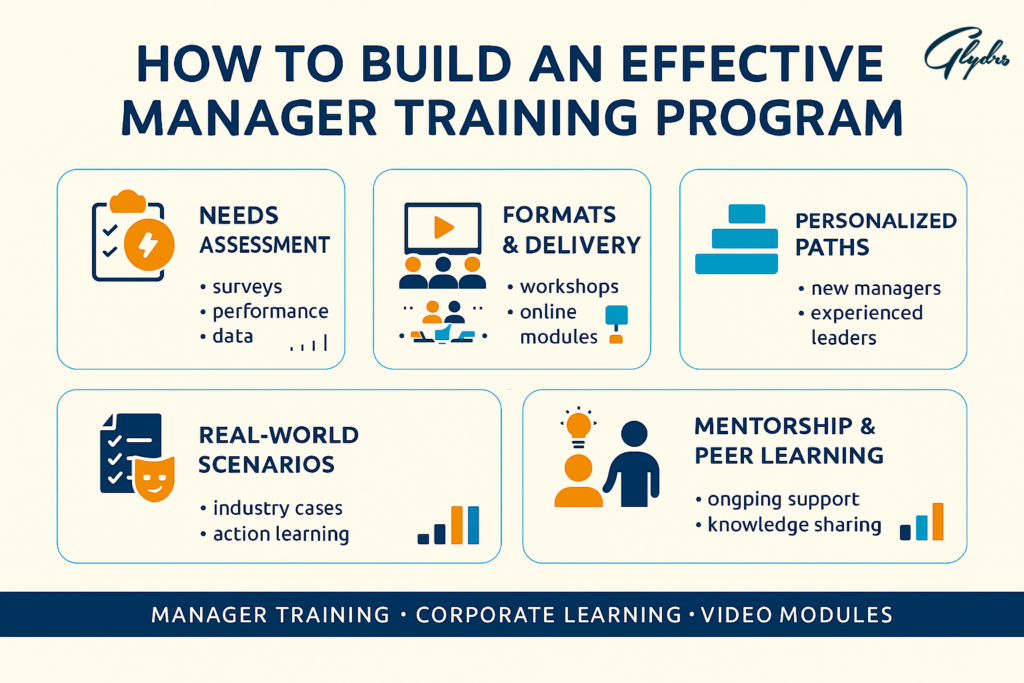
22 Oct Manager Training: Why do your managers need it?
Manager Training: The Hidden Cost of Untrained Management
You might think your managers are doing just fine “winging it,” but the numbers tell a different story. Research consistently shows that 82% of newly promoted managers receive no formal training for their role, yet they’re responsible for up to 70% of the variance in employee engagement scores. The staggering reality? Poor management costs U.S. companies up to $398 billion annually in lost productivity.
When your managers lack proper training, the ripple effects cascade throughout your entire organization. Untrained managers make decisions based on instinct rather than best practices, handle conflicts poorly, and often resort to micromanagement or complete hands-off approaches—neither of which serves your teams well. The hidden costs accumulate through increased turnover, decreased productivity, workplace conflicts, and ultimately, a damaged company culture that takes years to rebuild.
The old mentality of “learning on the job” simply isn’t enough in today’s complex business environment. Your managers face challenges that previous generations never encountered: remote team leadership, multi-generational workforces, rapid technological change, and evolving employee expectations around work-life balance and meaningful career development.
What Is Manager Training and Why Does It Matter?
Manager training is a comprehensive, structured approach to developing the leadership capabilities, interpersonal skills, and strategic thinking abilities that your managers need to excel in their roles. It goes far beyond basic supervisory skills to encompass emotional intelligence, conflict resolution, performance management, and the ability to inspire and develop others.
Unlike traditional management approaches that focused primarily on task delegation and oversight, modern manager training recognizes that today’s managers must be coaches, mentors, strategic thinkers, and culture champions. They need to navigate complex human dynamics while driving business results and adapting to constant change.
The distinction between management and leadership training is crucial here. While management training focuses on processes, systems, and operational efficiency, leadership development emphasizes vision, inspiration, and people development. The most effective manager training programs integrate both elements, creating well-rounded leaders who can manage tasks and inspire people.
Your managers serve as the crucial bridge between your organization’s strategic vision and day-to-day execution. When they’re properly trained, they become force multipliers who amplify your company’s effectiveness across every level of the organization.
The Undeniable Business Case for Manager Training
The return on investment for comprehensive manager training is both immediate and long-lasting. Organizations with highly engaged teams see 23% higher profitability, 18% higher productivity, and 12% better customer engagement metrics. The direct correlation between trained managers and these outcomes is undeniable.
Consider the math on employee retention alone. When you lose a skilled employee, replacement costs typically range from 50% to 200% of their annual salary when you factor in recruitment, onboarding, training, and the productivity loss during the transition period. Well-trained managers consistently achieve retention rates that are 40% higher than their untrained counterparts.
Your productivity metrics tell an equally compelling story. Teams led by trained managers demonstrate consistently higher performance, meet deadlines more reliably, and show greater innovation in problem-solving. These managers create psychological safety that encourages calculated risk-taking and creative thinking, leading to breakthrough solutions and continuous improvement.
The cultural impact extends throughout your organization in ways that are sometimes difficult to quantify but impossible to ignore. Trained managers model the behaviors and values you want to see, creating a positive cycle that influences hiring decisions, team dynamics, and your overall employer brand in the marketplace.

Where Manager Training Creates the Biggest Impact
Employee engagement represents one of the most significant areas where manager training delivers measurable results. Your managers directly influence their team members’ daily experience, motivation levels, and emotional connection to their work. Trained managers know how to recognize individual strengths, provide meaningful feedback, and create growth opportunities that keep employees energized and committed.
Conflict resolution becomes exponentially more effective when your managers have proper training. Instead of avoiding difficult conversations or escalating minor disagreements into major disruptions, trained managers can address issues early, facilitate productive discussions, and turn conflicts into opportunities for team growth and improved processes.
Decision-making quality improves dramatically when managers understand frameworks for analyzing complex situations, gathering input from stakeholders, and considering both short-term and long-term implications. They learn to balance data-driven analysis with intuitive insights and stakeholder perspectives.
Communication effectiveness touches every aspect of management success. Trained managers master the art of active listening, clear expectation-setting, and tailoring their communication style to different personality types and situations. They become skilled at facilitating meetings, presenting ideas persuasively, and creating open dialogue across hierarchical levels.
Your organization’s ability to adapt during times of change and uncertainty depends heavily on management capabilities. Trained managers can help their teams navigate transitions, maintain performance during disruptions, and even find opportunities within challenging circumstances.
Essential Training Areas Every Manager Needs
Core communication skills form the foundation of management effectiveness. Your managers need to master both the art and science of human interaction, learning how to listen actively, ask powerful questions, and provide feedback that motivates rather than deflates. They must understand how to adapt their communication style to different personalities, cultural backgrounds, and generational preferences within their teams.
Performance management extends far beyond annual reviews to encompass ongoing coaching conversations, goal alignment, and development planning. Trained managers learn how to set clear expectations, provide regular feedback, and create accountability systems that support both individual growth and team objectives.
Team building and collaboration techniques become increasingly important as organizations flatten hierarchies and rely more heavily on cross-functional cooperation. Your managers need to understand group dynamics, facilitate effective meetings, and create inclusive environments where diverse perspectives contribute to better outcomes.
Time management and delegation strategies are essential for managers who often struggle with the transition from individual contributor to leader. They must learn to prioritize strategically, delegate appropriately, and focus their energy on high-impact activities that only they can perform.
Emotional intelligence and empathy development represent perhaps the most critical areas for modern management success. Your managers need to understand their own emotional patterns, recognize emotions in others, and respond appropriately to various emotional situations that arise in the workplace.
Diversity, equity, and inclusion awareness training ensures that your managers can create welcoming environments for all team members while leveraging the benefits of diverse perspectives and experiences to drive innovation and performance.
Red Flags: Signs Your Managers Desperately Need Training
High employee turnover in specific departments often indicates management issues that training could address. When you see patterns of people leaving particular teams or citing “management style” in exit interviews, it’s a clear signal that manager training should be a priority.
Frequent workplace conflicts and HR complaints suggest that your managers lack the skills to address issues proactively or handle difficult situations diplomatically. Well-trained managers can often resolve conflicts before they escalate to formal complaint levels.
Poor communication between teams and organizational levels manifests in missed deadlines, duplicated efforts, unclear priorities, and general confusion about roles and responsibilities. These symptoms often indicate that managers need better communication and coordination skills.
Resistance to change and new initiatives may signal that your managers don’t understand how to lead through transitions or communicate the benefits of change effectively to their teams. They may need training in change management principles and techniques.
Declining employee satisfaction scores, particularly in areas related to management support, recognition, and development opportunities, indicate that your managers may need training in employee engagement and motivation strategies.
Inconsistent application of company policies across departments suggests that managers need better training in policy interpretation, decision-making frameworks, and maintaining fairness and consistency in their leadership approach.

How to Build an Effective Manager Training Program
Assessing your organization’s specific training needs requires a comprehensive analysis of current management capabilities, business objectives, and performance gaps. You need to gather input from multiple sources, including employee surveys, performance data, exit interviews, and direct observation of management practices.
Choosing the right training formats and delivery methods depends on your managers’ learning preferences, schedules, and the complexity of the skills being developed. Consider blending face-to-face workshops, online modules, peer learning groups, and individual coaching to create a comprehensive learning experience.
Creating personalized learning paths for different manager levels ensures that new managers receive foundational skills while experienced managers focus on advanced techniques and strategic capabilities. Your training approach should recognize that managers at different career stages have different development needs.
Incorporating real-world scenarios and practical applications makes training more relevant and immediately useful. Use case studies from your own industry, role-playing exercises based on common situations your managers face, and action learning projects that allow managers to apply new skills in their actual work environment.
Establishing mentorship and peer learning opportunities creates ongoing support systems that extend beyond formal training sessions. Experienced managers can share practical insights with newer managers while continuing to learn from fresh perspectives and approaches.
Measuring Success: ROI of Manager Training Initiatives
Key performance indicators should track both leading and lagging measures of training effectiveness. Leading indicators might include training completion rates, skill assessment scores, and manager confidence levels, while lagging indicators include employee engagement scores, retention rates, and team performance metrics.
Employee feedback and satisfaction metrics provide direct insight into how training impacts the day-to-day management experience. Regular pulse surveys can help you understand whether employees notice improvements in their managers’ capabilities and approach.
Retention rates and recruitment cost savings offer concrete financial measures of training ROI. Track turnover rates by manager and department both before and after training initiatives to quantify the impact on your bottom line.
Productivity improvements and goal achievement demonstrate the business impact of better management. Monitor team performance metrics, project completion rates, and quality indicators to assess how training translates into operational results.
Long-term organizational culture shifts represent the ultimate measure of training success. These changes may take months or years to fully manifest but create lasting competitive advantages that compound over time.
Keep reading and uncover secrets that can change the way you work. How to create training video engaging content
Common Pitfalls That Sabotage Manager Training Programs
One-size-fits-all training approaches fail to address the diverse needs, experience levels, and learning styles of your management team. Generic programs often feel irrelevant to managers who need specific skills for their unique situations and challenges.
Lack of ongoing support and reinforcement means that managers may struggle to apply new concepts without continued guidance and feedback. Training without follow-up coaching or peer support often results in managers reverting to old habits when faced with challenging situations.
Focusing solely on technical skills over soft skills creates managers who understand processes but struggle with the human elements of leadership. The most effective manager training programs balance both hard and soft skill development.
Insufficient time allocation for skill practice prevents managers from developing confidence and competence in new approaches. Skills like conflict resolution and performance coaching require repeated practice in safe environments before managers can apply them effectively in high-stakes situations.
Missing leadership buy-in and modeling undermines training effectiveness when senior leaders don’t demonstrate or support the behaviors being taught. Managers need to see that their own leaders value and practice the skills being developed.
Keep reading and uncover secrets that can change the way you work. The Ultimate Guide to Supervisor Training Topics
Creating a Culture of Continuous Manager Development
Moving beyond one-time training events requires a shift in mindset from training as an event to development as an ongoing process. Your organization needs to embed learning opportunities into regular management routines and expectations.
Implementing microlearning and just-in-time resources allows managers to access relevant information and skills exactly when they need them. This approach supports continuous improvement without overwhelming busy schedules.
Encouraging peer-to-peer learning and knowledge sharing leverages the collective wisdom of your management team while building stronger relationships and collaboration across departments and levels.
Regular skill assessments and development planning help managers understand their growth areas and create specific action plans for continued improvement. This systematic approach ensures that development remains focused and measurable.
Connecting training to career advancement opportunities motivates managers to engage seriously with development initiatives while creating clear pathways for progression within your organization.
Keep reading and uncover secrets that can change the way you work. What is Virtual Training? Tips & Examples
Transform Your Organization Through Manager Excellence
The multiplying effect of well-trained managers cannot be overstated. Each skilled manager influences not only their direct reports but also the broader team dynamics, departmental culture, and organizational effectiveness. When you invest in manager training, you’re creating ripple effects that extend far beyond the immediate participants.
Building a sustainable leadership pipeline through comprehensive training ensures that your organization has the management talent needed for future growth and success. Well-trained managers become the pool from which you draw future senior leaders.
Creating competitive advantage through superior management becomes increasingly important as organizations compete for talent in tight labor markets. Companies known for excellent management attract better employees, achieve higher performance, and build stronger reputations in their industries.
Your first steps should include conducting a thorough assessment of current management capabilities, identifying the most critical skill gaps, and designing a comprehensive training strategy that addresses both immediate needs and long-term development goals.
Turn your goals into real achievements with our tailored services – request the service now.
Frequently Asked Questions
How often should managers receive training?
The most effective approach combines intensive foundational training for new managers with ongoing skill reinforcement through quarterly workshops, monthly microlearning sessions, and annual comprehensive assessments. Established managers benefit from refresher training every 12-18 months, with specialized training as needed for new challenges or role expansions.
What’s the ideal duration for manager training programs?
Foundational manager training programs typically require 20-40 hours spread over 2-3 months to allow for practice and application between sessions. Advanced training can be delivered in shorter, more focused modules of 4-8 hours per topic. The key is balancing comprehensive learning with practical time constraints and immediate application opportunities.
Should training be mandatory or voluntary for managers?
Core management skills training should be mandatory for all managers. As these capabilities are essential job requirements rather than optional enhancements. However, advanced or specialized training can be voluntary. Allowing managers to pursue development areas that align with their interests and career goals while meeting business needs.
How do you handle resistant managers who don’t want training?
Address resistance by clearly communicating the business case for training. Involving managers in designing relevant content, starting with their most pressing challenges. And demonstrating quick wins from skill application. Sometimes resistance stems from past negative training experiences or concerns about time away from urgent responsibilities.
What’s the difference between leadership and management training?
Management training focuses on operational excellence: planning, organizing, directing, and controlling work processes. Leadership training emphasizes vision, inspiration, change management, and people development. The most effective programs integrate both elements. As modern managers need both management systems knowledge and leadership influence skills to succeed.
Your Next Steps Toward Management Excellence
The evidence is clear: organizations that invest in comprehensive manager training consistently outperform their competitors across every meaningful business metric. Your managers are either accelerating your success or inadvertently holding you back—there’s rarely a neutral middle ground.
The question isn’t whether you can afford to implement robust manager training programs. But rather whether you can afford not to. Every day you delay represents missed opportunities for improved performance, better retention, and stronger culture development.
Start by assessing your current management capabilities honestly. Then design a systematic approach to developing the leadership skills your organization needs to thrive. Your managers—and more importantly. Their teams—are waiting for the support and development that will help them reach their full potential. The investment you make in manager training today will compound over time. Creating a sustainable competitive advantage that transforms not just individual careers. But your entire organizational trajectory.


No Comments